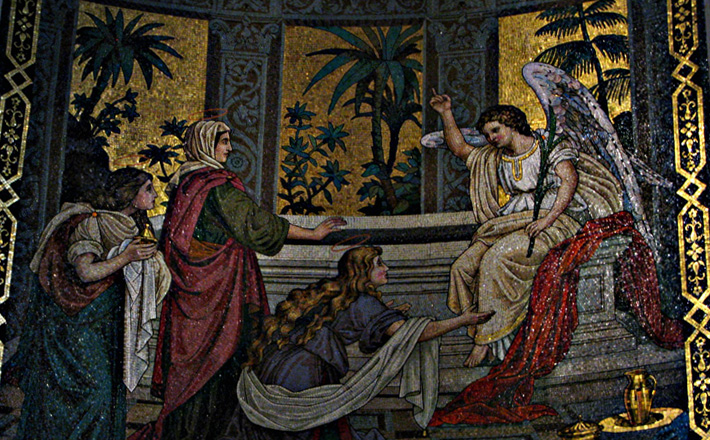Commentary on Colossians 3:1-4
In Colossians, Paul addresses a way of thinking and existing that runs counter to the thought and life rooted in the good news of Jesus Christ.
We just don’t really know for sure what this other “philosophy” was. Most likely, it was not something definite — Stoicism, mystical Judaism, or the like.
It was probably a mix of popular elements, as few people on the street were preoccupied with the technical details of philosophical jargon one finds among the literati of the day. Most people just wanted to make sense of their lives and find real meaning: a little Jesus, a little consumer escapism, a little Hollywood, a little nationalism, a little legalism.
Some ways of making sense of things, as good intentioned as they might be, have unintended consequences and even poor grounding when set next to the new life God gives in Christ. Such is Paul’s case in Colossians.
In the first four verses of Colossians 3 Paul articulates a central part of his overall argument: for those in the community of faith, the starting and ending point of existence is Christ. We don’t start somewhere else and get to Christ somehow; we don’t begin with Christ to get somewhere else; we don’t mix the best things about Christ into another foundation.
Christ brings death and life.
We have died with Christ. We now live in and with Christ. This is the basis for the meaning of life.
The clear imperatives in these verses concern where the believers are to set their focus: “seek things that are above…set your minds on things that are above” (3:1–2). So often this is taken to mean something like, “think about heaven,” “seek things that are of a Godly quality,” or “set your minds on things that are good, peaceful, divine, rather than things that will bring you down.”
Right in the middle of the two imperatives to “seek” and “set your minds,” Paul identifies “above” as “where Christ is seated at the right hand of God.” In doing this Paul draws attention to Christ’s lordship. The one who reigns as Lord of the universe, the one at the center of our seeking, is none other than the crucified Jesus, the image of God, who came to renew life.
The lordship of Christ is intimately connected to Paul’s reminder that we have been buried and raised with Christ. If we are raised with Christ, then we have died to the old life and all of its ways. We should, therefore, spend no time seeking after things that are under the lordship of the rulers of this earth (whether human rulers or human built “kingdoms” that seek to rule our lives).
We should no longer have any investment in their agendas, but in Christ’s. Seeking things that are above is all about re-orienting our allegiances to the Lordship of the crucified Christ, so that Christ’s lordship might be known and experienced in this life now.
Drawing attention to Christ’s lordship illuminates a different sort of “divine reality” for Paul’s audience. While we do not know with certainty the other “philosophy” that influenced those in Colossae, we do know it involved some sort of escapism or focus on some sort of communion with the heavenly realm. By drawing attention to Christ as the one “above” who should capture their attention and steer their lives, Paul draws attention not to escapism but to a heavenly reality that has made itself known in human form. This is down-to-earth-ism.
Paul transforms the way to look at things, calling the escapism and pursuit of heavenly realities pursuits ultimately rooted in “the things of the earth.” It is not true “spirituality.” It’s too lofty. Jesus is not “lofty.”
Christ in this letter is not just another divine intermediary by which one can attain union with the divine. For so many people still today, Jesus is a means to heaven. The manifestation of the mystery of God in Christ does not condone an escape from the earthly life, it is an embrace of this earthly life for the purpose of transformation and renewal. The hope of glory is not in heaven, it is in the body of Christ (Colossians 1:24–27).
When Paul says that our life is “hidden with Christ in God,” he gives the reason for seeking things above. That is to say, we seek life according to Christ’s lordship not as a means to get closer to God, but because now the identity of the believer’s life is found with Christ in God who came to us! This resonates with Galatians 2:19–20: “I have been crucified with Christ; I no longer live, but Christ lives in me; and what I now live in the flesh, I live in faith in the son of God who loved me and gave himself over for me.”
When Paul tells his audience, “your life is hidden with Christ in God,” he uses the plural. While Paul must use the plural because he is addressing a community, it does at times carry significance. It is not that my individual self is hidden with Christ — though it is. The emphasis here seems to be that the life of the body is hidden with Christ in God. To be hidden with Christ is to be in the body.
The upshot of being hidden with Christ is that “when Christ, our life, is ‘made manifest’ (phaneroo), then also we will be made manifest in glory.” It is typical to think of the future parousia here. But Paul never mentions the parousia in Colossians. Additionally, Paul does not use the verb “make manifest” (phaneroo) to refer to the parousia, but to refer to God’s “making manifest” of God’s good news of righteousness in Christ in the present time (Romans 3:21; 16:26), and the “making manifest” of Christ’s ongoing presence and work through the ekklesia (2 Corinthians 4:10–11).1
Paul goes on in Colossians 3 to talk about the present life, exhorting to put off the old life because those in Christ have died and have been raised with Christ. I wonder, then, if we can read Col. 3:4 as referring to the present and future before the parousia. Perhaps Paul is saying, “When Christ is made manifest in you all, as you all together display Christ to the world, it is then that you all also will (truly) be made manifest.”
We are not waiting around for Christ to be revealed, and so also for ourselves to be found, as if we are lost in the middle awaiting the coming of Christ. Our lives are so wrapped up in our union with Christ that where we once were “made manifest” in all sorts of other pursuits, now we cannot be made manifest apart from the ongoing work of the crucified Lord who reigns, who has been raised for us — and we in him and he in us — today.
—–
1 Unlike Romans 8:19, Paul is not talking about the revealing of the sons of God and the future glory here in Col. 3:4. Paul uses a different word in the Romans passage (apokalypsis).


April 20, 2014